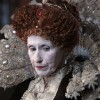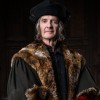I’d rather read Potter than Proust — confessions of a literary academic
written for The Times, 10th June 2016
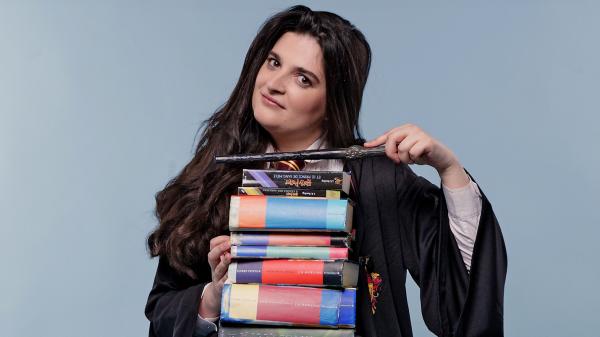
Image Credit: Chris McAndrew for The Times
In the summer of 1997, I started secondary school and so did Harry Potter. Potter obsessives will tell you that Harry James Potter was born on July 31, 1980, orphaned on Hallowe’en 1981, and arrived at Hogwarts School in the late summer of 1991 (certainly, the frazzled Muggle prime minister who makes a cameo a few years later is in the hapless Major mould).
In our universe, however, Harry first made his mark with the publication of Harry Potter and the Philosopher’s Stone, in June 1997. By September, I could recite every line of the book. I still can, give or take a few Quidditch scores.
Why did my generation love Harry so much? Why has interviewing the team behind the two-part stage play Harry Potter and the Cursed Child reduced me from a hard-nosed theatre critic and academic to a skittish teen?
My instinct is to be sceptical when big commercial franchises hit theatreland, but once full-price shows start in six weeks’ time, my friends and I will make the pilgrimage to the Palace Theatre in Soho, not once but twice, stumping up for each half of the latest JK Rowling cash cow. Why?
In part, it’s because we grew up with him. For those first four summers, until writer’s block and enormous franchise expansion slowed Rowling’s pace, we headed into each new school year with another of Harry’s school adventures to guide us.
The mythical detail of Rowling’s universe thrilled completists: to this day, Potterheads can list the magical characteristics of the wood in each hero’s wand, tracing the cultural histories of trees back to the oldest English folk legends. (This is Wagner for the BuzzFeed crowd.)
The humour, too, was addictive, from Rowling’s gentle social satire of the Radio 4 heartlands (Ron Weasley’s middle-aged mum always tunes in for Celestina Warbeck, “The Singing Sorceress”, crooning on The Witching Hour) to the sheer absurdism of Luna Lovegood’s conspiracy theories (“The Aurors are part of the Rotfang Conspiracy, I thought everyone knew that. They’re working to bring down the Ministry of Magic from within using a combination of Dark Magic and gum disease.”)
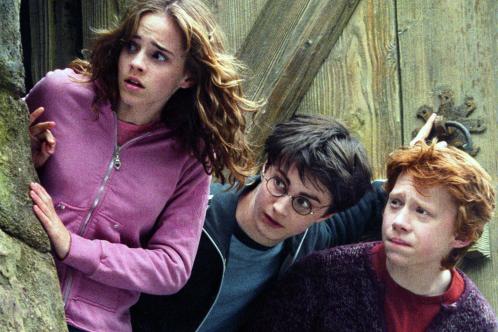
Emma Watson, Daniel Radcliffe and Rupert Grint from the Harry Potter films
Image Credit: Alamy
In the darkest days of evil Lord Voldemort’s terror campaign, the wizarding world remains too fearful to utter his name, referring to the Dark Lord as “You-Know-Who”. Magical prank-shop entrepreneurs Fred and George Weasley respond to this climate by launching a new product: “WHY ARE YOU WORRYING ABOUT YOU-KNOW-WHO? YOU SHOULD BE WORRYING ABOUT U-NO-POO! THE CONSTIPATION SENSATION THAT’S GRIPPING THE NATION!”
Yet if Rowling captured the moral imagination of millennials (primarily, those born in the 1980s like me) perhaps it’s because Harry Potter speaks to our generation’s political obsession: identity. The genetic markers for magic are mysterious; what’s clear is that many of Harry’s fellow students at Hogwarts were born to wizarding parents, but others have been talent-spotted from the oblivious non-magical community who live alongside them, “Muggles”.
Some of the former, unsurprisingly, despise the children of Muggles: “I really don’t think they should let the other sort in, do you? They’re just not the same, they’ve never been brought up to know our ways,” says “pure-blood” bully Draco Malfoy when he meets Harry. When Draco later uses the word “mudblood” to refer to Harry’s Muggle-born friend Hermione, her friends react as if he’d uttered the American “n-word”.
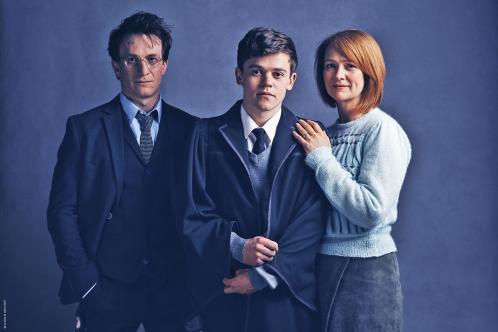
Jamie Parker as grown-up Harry in the play, Poppy Miller as his wife Ginny, and Sam Clemmett as their son, Albus.
Image Credit: Charlie Gray
Millennials are pretty aware that we don’t like racists, but then the conversation around race and identity gets loud and muddled, particularly on university campuses, where self-segregation seems to be re-emerging. Rowling’s anti-racist politics have always offered us a more nuanced model. Her vision of human experience is as an uneasy melting pot of influences, loyalties that sometimes compete and sometimes converge.
The characters who face crucial moral choices — heroic Harry, satanic Lord Voldemort, double agent Severus Snape and even Harry’s wise, damaged headmaster, Albus Dumbledore — all turn out to be “half-bloods”, ie the children of parents from magical and non-magical communities.
It’s the elements of their heritage that they choose to embrace or to reject that end up defining the future of their universe. To a generation that is four times as likely to be mixed-race as the baby boomers (in both Britain and the US) they offer a compelling set of role models.
Melissa Anelli, the webmistress of the Leaky Cauldron fansite, talks about “values” as the unifying feature of Harry Potter’s globally dispersed fans, quoting Rowling herself, who has called the books “a prolonged argument for tolerance, a prolonged plea for an end to bigotry”. Like me, Anelli was disappointed by the negativity with which some fans reacted to the casting of the black actress Noma Dumezweni as Hermione Granger in Harry Potter and the Cursed Child.
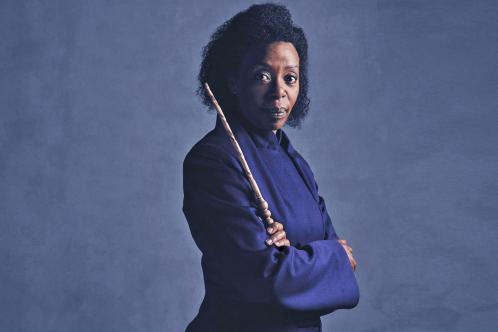
Noma Dumezweni will play Hermione Granger on stage
Image credit: Charlie Gray/PA Wire
“Noma was always my Hermione,” says John Tiffany, the play’s director. “She contributed so much all the way through the process. And it is racism, simple racism. It’s part of this deep fear of people as the Other that seems to be bubbling up in the climate again — the political climate. But what are we telling people when we object to a black person playing a heroic character?”
Not everyone sees it that way. MuggleNet, Anelli’s main rival site, also “took a strong line” in support of Dumezweni’s casting, but MuggleNet’s creative director, Kat Miller, at least offers a rationale: “I think the problem is that fans have always been very invested in the film franchise, not just the books; they see Emma Watson as a canonical Hermione, and they can’t quite get their heads around anyone who doesn’t look like her.”
It exposes a broader problem for the Cursed Child team — what to do about the Harry Potter fan who expects to see the films on stage? “I hope we can see it as a contract,” says Tiffany. “As theatre-makers — and I didn’t grow up with the books — we’re going into the Potter universe and saying we respect the things you care about, we’re going to try to be true to these stories. And in turn, a Potter audience is coming into a theatre, and we’re asking them to respect how we do things. We’re taking a bit of a chance on each other.”
It helps that he’s working with a new story. Cursed Child starts the moment the epilogue of Rowling’s final Potter novel ends, as Harry, Hermione and Ron wave their own children off to Hogwarts. This is a new generation’s adventure, though Harry, world-famous hero and middle-aged dad, will feature.
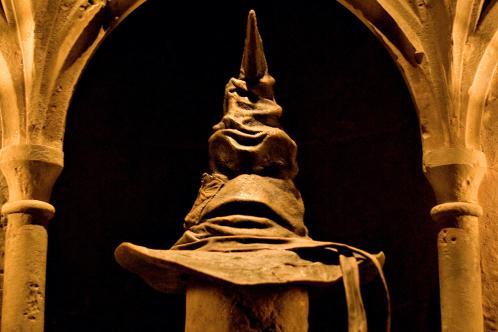
Will the Sorting Hat, from Harry’s first year at school, be getting a redesign?
Image credit: Alamy
Sonia Friedman, the powerful West End producer who pitched the idea of a play to Rowling, sees Harry’s legacy as the emotional heart of the plot. “As someone who had quite a tough, troubled relationship with my father” — Friedman’s father, the mercurial violinist Leonard Friedman, left her mother with four children under the age of ten — “that always felt to me like a very human question.”
Is she admitting that Albus, Harry and his wife Ginny’s awkward middle child, could be the Cursed Child of the title? Or Scorpius Malfoy, involuntary scion of a long line of dark wizards? All I get in response is a gleeful cackle.
Friedman and Tiffany make the case that the Potter books are innately theatrical. The dialogue dazzles and spectacle abounds, but plots are driven primarily by characters telling stories. (Think of the Chaucer-like Tale of the Three Brothers, or Fred and George Weasley’s penchant for revealing gossip.) And let’s hope that Rowling’s wobblier touch for prose — those interminable inner monologues for an angsty teenage Harry, or sub-Roald Dahl depictions of his early life with abusive Muggles), can be quietly effaced in a theatre script.
Tiffany’s previous shows, notably Black Watch and Let the Right One In, have relied on the theatrical potential of suggestion (the latter with playwright Jack Thorne, who has written the script for Cursed Child based on Rowling’s story). That bodes well, although some have criticised shows where he has tried to work specifically for children (The Twits, based on Dahl, was recently labelled “tedious” by The Times).
Production photos suggest that Cursed Child’s universe is big-budget and about as naturalistic as a show about Nargles and Pygmy Puffs can get. Widely shared reports from the first previews even revealed the use of live owls in the theatre auditorium — one of which went rogue, swooped over the audience, and had to be recaptured during the intermission. This isn’t going to be Peter Brook does Hogwarts.
For Katrina Lindsay, the production’s costume designer, the pressure of fan expectations is huge. “I work a great deal in opera [one recent collaborator is Terry Gilliam] so I suppose I’m used to creating complete worlds.” But Hogwarts is something different: “It’s a very complete universe, a very detailed one.” Like Tiffany, she has tried not to replicate the film franchise. “But there is one story, one book, where I did watch the film again several times, quite carefully, if only to know what expectations I was working against.”
That’s a tantalising, if inscrutable, nugget: is she redesigning the Sorting Hat from Harry’s first year at school, or can we hope to see a replay of the sporting tournaments that dominated The Goblet of Fire? Other fans are betting on a replay of the anthropomorphic adventures of Harry Potter’s father’s generation, detailed in The Prisoner of Azkaban.
Anelli goes further, speaking of Hogwarts’ “living” portraits: “I will make a bet right now that somewhere in that play is a scene where Albus ends up inside the headmaster’s office, and one of the portraits makes the very rare move of speaking to someone besides the headmaster. And that portrait will be of Severus Snape.”
Personally, I’m hoping that Albus makes a visit to the soul-exposing Mirror of Erised, as his father did before him. (And if this is beginning to sound obsessive, just know that out there on the fansites, the predictions get a lot geekier.)
Can the play succeed critically? The critics won’t deliver their verdicts until press night on July 30. But what will it take for Harry Potter to please both my inner superfan and my outer theatre critic? Less spectacle, more simplicity, perhaps. Lloyd Webber-esque love duets for Ron and Hermione might be a bad sign. Most of all, I’m looking for a story that’s true to JK Rowling’s values. Oral storytelling for the half-blood generation.





